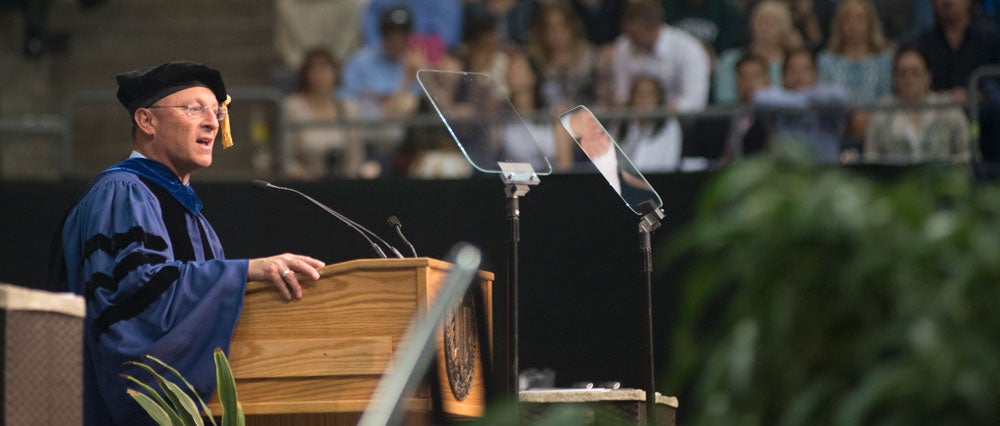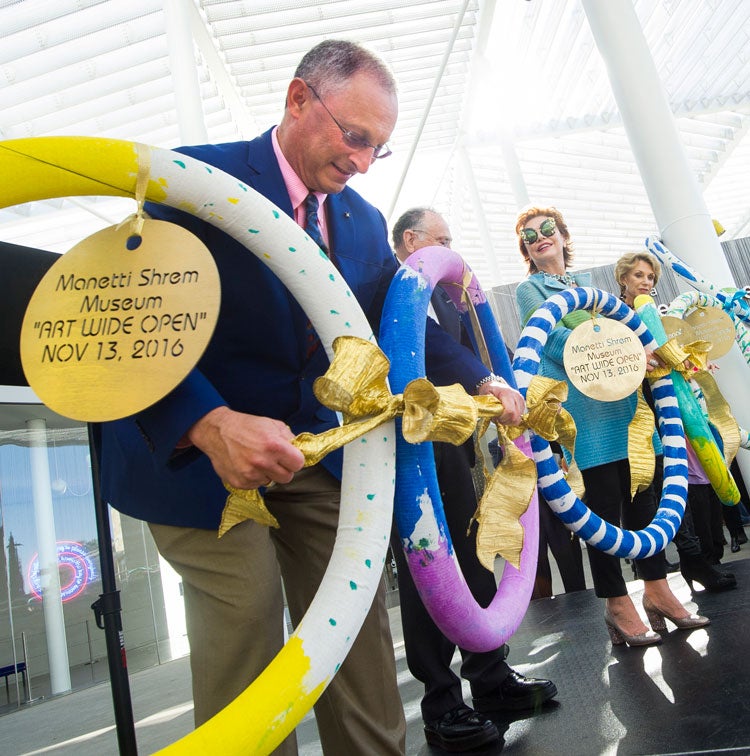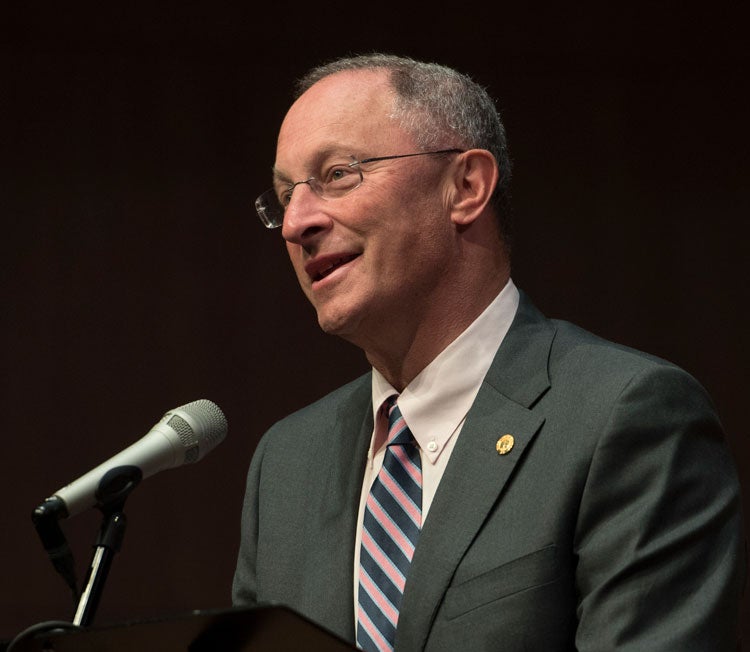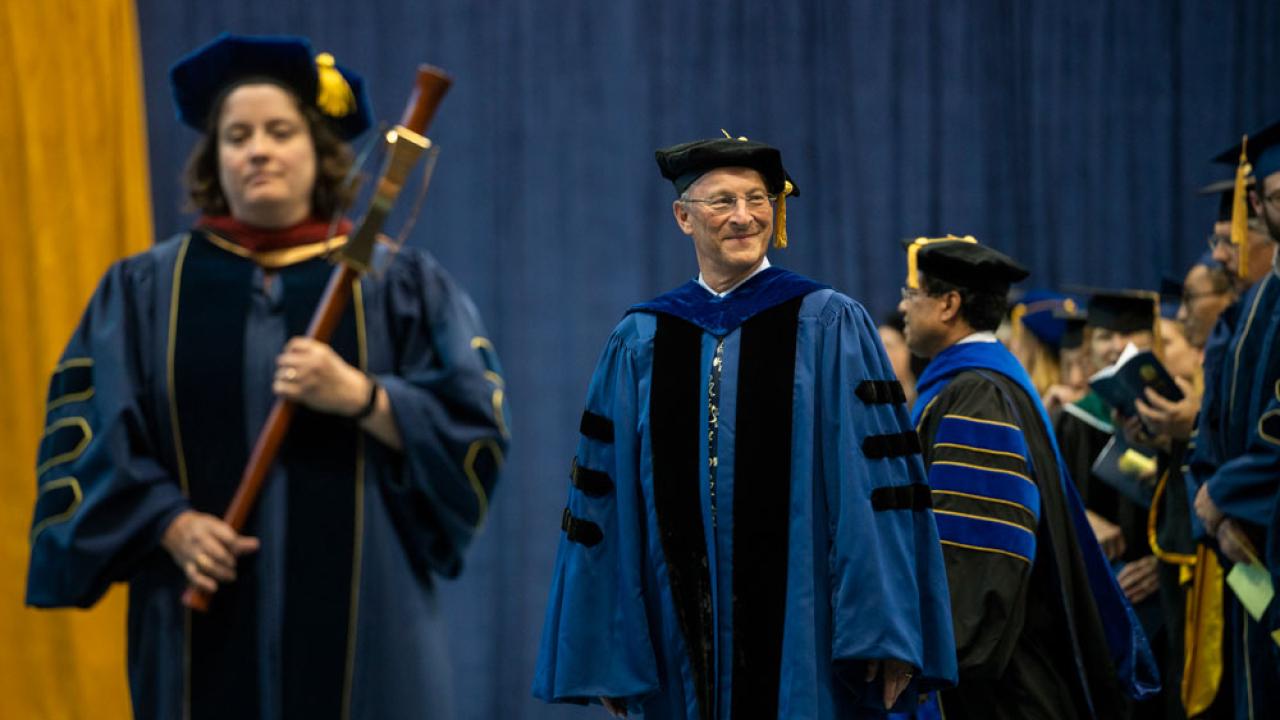Quick Summary
- He took office as provost and executive vice chancellor in 2011, and served as acting and then interim chancellor in 2016-17
- Strong advocate of freedom of expression, dialogue and “the critical evaluation of ideas, especially when we address controversial issues”
- A member of the American Academy of Arts and Sciences, he intends to return to teaching, research and writing in classics and comparative literature
Ralph J. Hexter, provost and executive vice chancellor of the University of California, Davis, since 2011, announced today (Sept. 17) that he will step down from campus leadership at the end of the 2019-20 academic year to refocus his energies on his teaching and research in classics and comparative literature.
By June of next year, his tenure as provost and executive vice chancellor will have spanned 9½ years, including 15 months as acting and then interim chancellor. “To me, that seems sufficient, and periodic renewal in every position is an essential element of institutional growth,” Hexter said in a letter to deans and vice provosts and others who report to him.
Hexter filled in as chancellor from late April 2016 until Aug. 1, 2017, the day Gary S. May’s appointment took effect. “I want to thank Ralph for his service to the University of California and his dedication to our mission of teaching, research and public service,” May said. “Ralph is an extraordinary leader — professorial yet approachable, traditional yet forward-looking, focused on the institution yet global in his thinking. He demonstrates wisdom and compassion on a regular basis, and always has sage advice.”
The chancellor also praised Hexter for helping lead UC Davis’ remarkable growth over the last several years — in enrollment, faculty positions and infrastructure resulting from the 2020 Initiative and related programs such as the faculty Hiring and Investment Program, or HIP. In addition, he took on oversight of the new Office of Enrollment Management, which, among other responsibilities, focuses on diversity among new students.
Hexter, who began his UC Davis tenure on Jan. 1, 2011, is also drawing praise from the Davis Division of the Academic Senate, whose chair, psychology professor Kristin Lagattuta, said: “On behalf of the Academic Senate, I want to thank Ralph for his commitment to our shared governance.
“We appreciate Ralph’s tremendous passion for the academic enterprise, including the impact of faculty teaching, mentoring and scholarly work on student learning and success. He cares deeply about building and strengthening opportunities for everyone in the UC Davis community.”
‘Broadest range of ideas’

As acting and then interim chancellor, Hexter deftly guided UC Davis not only through a change in administrations, but also through the beginning of the national debate over free speech as people began opposing appearances by controversial speakers such as Milo Yiannopoulos, even at institutions of higher learning (including UC Davis) that have long been bastions for the free expression of ideas.
“In these contentious times, it is more than ever crucial that we improve our capacity to conduct debates and dialogue — that is, if we want our university to be a true community, and also a true scholarly community, one that fearlessly pursues truth by critically engaging with the broadest range of ideas,” Hexter said in his Fall Convocation address, “Inspiring Dialogue and Community,” in September 2016.
Three months later, at Fall Commencement, he advocated for “Discernment” — “the power to see fine distinctions” and detect “falsehood, misinformation and misleading statements.” Then, in February 2017, he launched the “Dialogue and Discernment” speaker series — offering “opportunities for our community to come together to discuss the value and practice of informed and rational dialogue and the critical evaluation of ideas — especially when we address controversial issues.”
He also has advanced his ideas about dialogue and other important issues in commencement addresses on such atypical topics as “A Defense of Irresponsibility,” “Truth” and “Nothing.”
Community engagement

Hexter has had a major impact on the makeup of campus administration. He recruited all but one of the 17 deans and vice provosts currently serving in their roles, the new associate vice chancellor for enrollment management and, while acting chancellor, the director of athletics.
He also presided over the openings of major new campus facilities, including the Ann E. Pitzer Center for music instruction and recitals, the Jan Shrem and Maria Manetti Shrem Museum of Art, the International Center, and the Betty Irene Moore Hall of the Betty Irene Moore School of Nursing at UC Davis Health. A strong champion of the idea of “One UC Davis,” which encourages stronger connections between the Davis and Sacramento campuses, he also serves on the governing body of the UC Davis Medical Center.
As provost, Hexter has been a champion of community engagement for faculty, students and staff, both to facilitate the positive real-world impacts of their work and to make its value more visible to the public. In 2015, he created an advisory committee to explore ways to advance community-engaged scholarship at the university, in September 2018 establishing the Office of Public Scholarship and Engagement. In part because of the university’s record in this area, Imagining America: Artists and Scholars in Public Life, a national consortium, selected UC Davis to be its institutional home.
“UC Davis has been rising in achievement and reputation for many years,” Hexter observed. He said he has been “honored and privileged” to serve in UC Davis leadership over the last decade, a period during which “the university seems finally to have achieved a significant portion of the recognition it deserves.” He praised UC Davis leadership as “remarkably diverse, able and innovative,” calling Gary May “a visionary chancellor who will continue to lead us to yet greater heights.”
A scholarly decision
Chancellor May said plans will be announced soon for a national search for UC Davis’ next provost and executive vice chancellor. Hexter said he is prepared to remain in office until a successor can begin, adding: “Please have no doubt about my commitment to the University of California and UC Davis in particular.”

Hexter, elected to the American Academy of Arts and Sciences in 2016, emphasized his strong desire to shift his primary focus back to scholarly activities. “In 1995, the University of California hired me to teach and do research in classics and comparative literature,” he said, referring to his appointment to the Berkeley faculty, but he can barely remember a time when he did not have to divide his energies between scholarly and administrative responsibilities.
“Indeed, since fall 1990, there have been only two months when I did not also have a major administrative job in one institution or another,” he said.
At Berkeley, he served as chair of the comparative literature department, dean of the Division of Arts and Humanities, and executive dean of the College of Letters and Science.
In between Berkeley and Davis, he was president of Hampshire College, a small and distinctive liberal arts institution in Amherst, Massachusetts. Upon his appointment in 2005, he was one of the few openly gay presidents in higher education in the nation; five years later he was a founding member of LGBTQ Presidents in Higher Education, which since then has enrolled more than 90 college or university presidents and chancellors.
Besides turning his attention to research projects in classics and comparative literature, Hexter said he also may write on pressing issues in higher education. In 2012 he launched The UC Davis Forums on the Public University and the Social Good (originally called The Provost’s Forums), a distinguished lecture series aimed at advancing understanding and dialogue on “what the public university can and should be in the 21st century.”
In his letter to his direct reports, Hexter gave the following direction for their work during his final year as provost. “Our current context is one where external forces mandate that we evolve many of the ways we fulfill our missions. We must, together, and in close consultation with the Academic Senate and other key stakeholders, generate a range of ideas and principles that will prepare the institution for the work ahead.”
Media Resources
Melissa Blouin, News and Media Relations, 530-752-2542, mlblouin@ucdavis.edu
